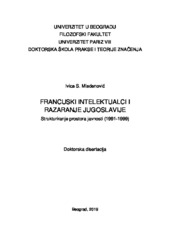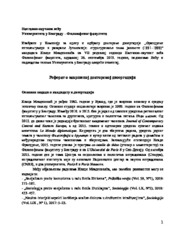Приказ основних података о дисертацији
Francuski intelektualci i razaranje Jugoslavije: strukturisanje polja javnosti (1991-1999)
French intellectuals and the destruction of Yougoslavia: structuring of the public space (1991-1999)
| dc.contributor.advisor | Spasić, Ivana | |
| dc.contributor.other | Jeanpierre, Laurent | |
| dc.contributor.other | Spasić, Ivana | |
| dc.contributor.other | Stojanović, Dubravka | |
| dc.contributor.other | Filipović, Mirko | |
| dc.creator | Mladenović, Ivica | |
| dc.date.accessioned | 2020-12-25T14:45:01Z | |
| dc.date.available | 2020-12-25T14:45:01Z | |
| dc.date.issued | 2020-09-25 | |
| dc.identifier.uri | http://eteze.bg.ac.rs/application/showtheses?thesesId=7822 | |
| dc.identifier.uri | https://fedorabg.bg.ac.rs/fedora/get/o:23098/bdef:Content/download | |
| dc.identifier.uri | http://vbs.rs/scripts/cobiss?command=DISPLAY&base=70036&RID=28441097 | |
| dc.identifier.uri | https://nardus.mpn.gov.rs/handle/123456789/17724 | |
| dc.description.abstract | Istraživanje je osmišljeno kao jedan oblik a posteriori društveno-istorijskog eksperimenta: da bih otkrio obrise strukture jednog društvenog univerzuma, kakav je francusko intelektualno polje, veštački sam izazivao efekat „crvene krpe“, uključujući u njega jedan od potencijalnih operatora, odnosno „jugoslovensku aferu“. Rečena afera poseduje specifična svojstva, a pritom je trajala gotovo čitavu jednu deceniju i permanentno je izazivala reakcije velikog broja dejstvenika u prostoru javnosti Francuske. Glavni cilj istraživanja je, dakle, da uz pomoć prospografskog pristupa dejstvenicima, kao i analize njihovih akcija i reprezentacija, odgovorim na sledeća pitanja: koji su modaliteti i forme intervencija unutar – oko „jugoslovenske afere“ (1991-1999) – konstruisanog polemičkog prostora u francuskom prostoru javnosti; kako se dati prostor kroz pojedinačne i grupne antagonizme i konkurenciju strukturiše, tj. kakva je veza između, s jedne strane, objektivnih pozicija intelektualaca, i, s druge, njihovih idejno-političkih dispozicija i zauzimanja političkih pozicija u „jugoslovenskoj aferi“ (odnosno argumentacije i sredstava koje koriste kako bi iste legitimisali i nametnuli drugima); koja je logika recepcije razaranja Jugoslavije i ratova za njeno nasleđe u Francuskoj, odnosno da li je ona primarno vezana za događaje u bivšoj Jugoslaviji, ili za unutrašnje političke izazove u Francuskoj; da li su i u kom pravcu različita tumačenja evoluirala u odnosu na evoluciju jugoslovenske stvarnosti; i kako se zazimanje pozicija i strana u odnosu na „jugoslovensku aferu“ uklapaju u postojeće odnose snaga u Francuskoj: da li su – i na koji način – uslovljeni postojećim strukturama, odnosno da li eventualno i sami utiču na (re)konfiguraciju francuskog intelektualnog polja. Da bih na ova pitanja odgovorio, poslužio sam se oruđima sociologije politike, istorijske sociologije, sociologije saznanja, odnosno sociologije intelektualaca. Pored toga, koristio sam 5 teorijski aparat Burdijeove „teorije polja“, ali i Gramšijeve teorije „kulturne hegemonije“ i Milićeve „teorije društvene funkcije ideja i saznanja“, kao i metodološke postupke poput „analize višestrukog podudaranja“, „socio-istorijske analize“, „kritičke analize diskursa“. Ovakav pristup mi je omogućio da utvrdim način strukturiranja analiziranog polemičkog prostora, odnosno idejno-političke karakterestike glavnih opozicionih blokova, utemeljenih na objektivnim svojstvima proučavanih intelektualaca | sr |
| dc.description.abstract | The research is conceived to be a sort of a posteriori socio-historical experiment: aiming to discern the outlines of a social universe, such as the French intellectual field, the “red cloth” effect, containing one of its potential operators – “the Yugoslav affair” – was artificially produced. Similarly to the intellectual field, the “Yugoslav affair” has its’ specificities. It also lasted for almost a decade, thus permanently provoking many actors in the French public space to react. The prosopographic approach to the actors, as well as an action and representation analysis were used in other to attain the main aim of the study, which is to provide answers to the following questions: defining procedures and forms of intervention, pertaining to the “Yugoslav affair”, within the polemical space constructed in the French public space; defining the way in which the space is structured by the individual and collective antagonisms and competitions, or rather exploring the connection between the objective positions of the intellectuals on one hand, and on the other their political stands in the “Yugoslav affair” (their argumentation and means used in order to legitimize their views and to impose them on others); determining the logic of the reception and the representation of the breakup of Yugoslavia and the wars for its heritage and deciding whether the logic depends primarily on the events in former Yugoslavia or on the internal political challenges in France; determining whether and how the different interpretations evolved, compared to the evolution of Yugoslav realities; determining the way in which taking a particular stand pertaining to “the Yugoslav affair” corresponds to the existing balance of power in France; determining whether and how the intellectuals are dependent on the existing structures and whether they are influencing the (re)configuration of the French intellectual field. In order to answer these questions, I set my research in the disciplinary framework of the sociology of politics, the history of sociology, the 7 sociology of sknowledge, as well as the sociology of intellectuals. I have also used the theoretical apparatus of Pierre Bourdieu’s “field theory”, Antonio Gramsci’s “theory of cultural hegemony” and Vojin Milic’s “theory of social function of the ideas and knowledge”, as well as methodological procedures such as “the multiple correspondence analysis”, “socio-historical analysis”, “critical discourse analysis”. This approach allowed me to establish the ways in which the analyzed polemical space was structured, or rather the ideopolitical characteristics of the main opposing blocks, based on the objective particularities of the studied intellectuals | en |
| dc.format | application/pdf | |
| dc.language | sr | |
| dc.publisher | Универзитет у Београду, Филозофски факултет | sr |
| dc.rights | openAccess | en |
| dc.source | Универзитет у Београду | sr |
| dc.subject | intelektualci | sr |
| dc.subject | intellectuals | en |
| dc.subject | intellectual field | en |
| dc.subject | public space | en |
| dc.subject | position | en |
| dc.subject | disposition | en |
| dc.subject | position taking | en |
| dc.subject | intelektualno polje | sr |
| dc.subject | prostor javnosti | sr |
| dc.subject | pozicije | sr |
| dc.subject | dispozicije | sr |
| dc.subject | zauzimanje pozicija | sr |
| dc.title | Francuski intelektualci i razaranje Jugoslavije: strukturisanje polja javnosti (1991-1999) | sr |
| dc.title.alternative | French intellectuals and the destruction of Yougoslavia: structuring of the public space (1991-1999) | en |
| dc.type | doctoralThesis | en |
| dc.rights.license | ARR | |
| dcterms.abstract | Спасић, Ивана; Филиповић, Мирко; Јеанпиерре, Лаурент; Спасић, Ивана; Стојановић, Дубравка; Младеновић, Ивица; Француски интелектуалци и разарање Југославије: структурисање поља јавности (1991-1999); Француски интелектуалци и разарање Југославије: структурисање поља јавности (1991-1999); | |
| dc.identifier.fulltext | https://nardus.mpn.gov.rs/bitstream/id/67453/IzvestajKomisije23523.pdf | |
| dc.identifier.fulltext | https://nardus.mpn.gov.rs/bitstream/id/67452/Disertacija.pdf | |
| dc.identifier.rcub | https://hdl.handle.net/21.15107/rcub_nardus_17724 |



